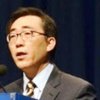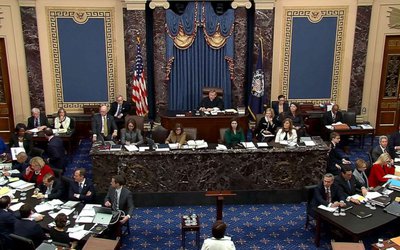I am honored to lead the Korean delegation to the General Conference . There is no other country like Korea that can feel the stark contrast between the benefit and threat from nuclear power at the same time. As a founding member of the IAEA, we are currently the world’s fifth largest producer of nuclear energy, with 24 reactors in operation. As a result, in satellite imagery, the southern half of the Korean peninsula is full of bright lights.
Then we have a neighbor, North Korea, which poses a constant nuclear threat against us. It withdrew from the IAEA two decades ago and still refuses to apply safeguards; it is pursuing a nuclear weapons program at the expense of its own people, violating all international obligations. As a result, the northern half of the Korean peninsula remains in deep darkness.
Non-proliferation
From its inception, the mission of the IAEA was to accelerate and enlarge the contribution of atomic energy to peace, health and prosperity throughout the world. It was established to unleash the vast potential of nuclear technology to meet the challenges of the time, inspiring us to “boldly go where no one has gone before.” At the same time, it assumed the role of nuclear watchdog, so to speak.
The Republic of Korea is fully committed to nuclear non-proliferation, as we believe that nuclear non-proliferation regime based on NPT and IAEA’s safeguards system is the cornerstone of international peace and security, and sine qua non for the sustainable development of nuclear energy.
In this regard, I would like to share with you two recent developments. First, Korea has become one of the two member states to apply the new version of the State Level Approach (SLA), in fact from this month. Second, we have been elected as the next Chair of the Nuclear Suppliers Group (NSG) from 2016 to 2017, and will host the NSG Plenary Meeting in Seoul next year. My Government will continue to work together with the IAEA and the international community to strengthen the nuclear non-proliferation regime.
Nuclear Security
As the host of the 2012 Nuclear Security Summit (NSS), Korea firmly believes that nuclear security needs to be strengthened in parallel with nuclear non-proliferation and nuclear safety. Korea has contributed nearly five million US dollars since 2012 to the IAEA’s Nuclear Security Fund (NSF), and is actively participating in global efforts to enhance nuclear security.
Such efforts include the development of new high-density LEU fuel as part of an effort to phase out HEU fuel in reactors, the enhancement of cyber-security of nuclear infrastructure, and the trilateral project to build a Radiation Source Location Tracking System (RADLOT) in cooperation with the IAEA and Vietnam.
Furthermore, as announced at the Board of Governors Meeting held last week, the Foreign Minister of the Republic of Korea will serve as the Chair of the IAEA’s 2016 International Nuclear Security Conference. The IAEA has a central role to play in building an enduring nuclear security architecture following the conclusion of the NSS process in 2016. Our decision to assume the chairmanship of this Conference is a clear demonstration of our strong commitment to enhance global nuclear security.
Nuclear Safety
Nuclear safety is another element which is essential for the sustainable development of nuclear energy. We believe that the Report on the Fukushima Daiichi Accident will serve to raise once again the awareness in the international community of the crucial importance of nuclear safety.
Korea invited the IAEA’s integrated Regulatory Review Service (IRRS) in 2011 and 2014, and the Review Service noted Korea’s efforts to effectively enhance its nuclear safety regulatory infrastructure. Early this year, we revised our Nuclear Safety Act in order to achieve further improvements in its safety standards. In the future, we will also incorporate the ideas and principles of the Vienna Declaration on Nuclear Safety into our safety regulations.
Korea also recognizes the entry into force of the Convention on Supplementary Compensation (CSC) for Nuclear Damage as an important milestone toward a global nuclear liability regime. We will consider the issue of joining the CSC in due course.
Nuclear Safety Cooperation in Northeast Asia
Northeast Asia is the region with the highest concentration of nuclear power plants in the world. The Fukushima Daiichi accident of 2011 only too vividly demonstrated the need to gather collective wisdom and strengthen cooperation for nuclear safety in the region.
It is against this backdrop that President Park Geun-hye proposed the establishment of a Northeast Asian Nuclear Safety Consultative Body, bringing together countries of the region including Korea, Japan and China, among others. My Government is pursuing various avenues to promote intra-regional cooperation for nuclear safety in order to bring this idea to fruition.
As part of the efforts to strengthen regional cooperation in nuclear safety, Korea will host the 8th Top Regulators’ Meeting (TRM) next month. This meeting, in which nuclear regulators from Korea, Japan and China participate, will be followed by the Northeast Asia Nuclear Safety Cooperation Conference, which is an extended TRM+ meeting that will bring together a number of other countries and international organizations.
My delegation firmly believes that building up a practice of dialogue and cooperation in this field will be crucial for the Northeast Asia Peace and Cooperation Initiative (NAPCI) pursued by the Republic of Korea. This Initiative seeks to build sustainable peace and prosperity in Northeast Asia through confidence building and heightened cooperation, starting with soft security issues.
Continued Development of Nuclear Energy
Next week, the UN Sustainable Development Summit is to be held in New York. Nuclear energy, as a low-carbon energy source, is indeed a highly effective means to achieve the sustainable development goals (SDGs). Korea plans to increase the total number of nuclear power plants from 24 to 34 by 2035; accordingly, our reliance on nuclear energy in power generation will rise from the current level of 22.5% to 29%.
With a view to sharing the benefits of nuclear energy with the broader international community, Korea has contributed about 5 million US dollars over the past five years under the Peaceful Uses Initiative (PUI), with a special focus on Coordinated Research Project (CRP), the IAEA Program of Action for Cancer Therapy (PACT). Korea is also actively engaged in partnership programs within the framework of the Asia-Pacific Regional Cooperation Agreement (RCA).
Moreover, we have a great interest in developing innovative nuclear technologies, including pyro-processing, Sodium-cooled Fast Reactors (SFRs), and Very-High-Temperature Reactors (VHTRs). Korea is currently constructing a new research reactor for stable supply of medical isotopes, and participating in the IAEA project on medical isotope production using LEU targets.
Vice Foreign Minister Cho and IAEA Director General Yukiya Amano(right) pose for a photograph before holding discussions on issues of mutual concern, including the North Korea nuclear issue and the implementation of the Iranian nuclear deal.
Iran
Two months ago, the Joint Comprehensive Plan of Action (JCPOA) was agreed upon between E3/EU+3 and Iran here in Vienna. The Republic of Korea welcomes the adoption of the JCPOA, and notes with great satisfaction the Roadmap agreed upon by Iran and the IAEA as an important step forward.
In particular, we note that the JCPOA has a robust verification scheme including the application of Additional Protocol to Iran. It is our sincere hope that, through the implementation of the JCPOA, confidence will be built among all parties and the nuclear non-proliferation regime will be strengthened. The recent agreement has amply shown that it is possible to resolve the issue of nuclear proliferation through dialogue. It has proven the power of diplomacy.
North Korea
With the conclusion of the JCPOA, Mr. President, we have taken valuable first steps towards resolving one of the two pressing cases of nuclear proliferation. Now is the time for the international community to build upon the momentum generated by the Iranian nuclear agreement and unite in our common efforts to resolve the North Korean nuclear issue.
North Korea’s pursuit of nuclear weapons not only undermines the very foundation of the global non-proliferation regime, but poses a serious threat to peace and stability on the Korean Peninsula and beyond. The problem is that North Korea continues to reject proposals of dialogue on denuclearization, while advancing its nuclear capabilities.
North Korea is violating, on a daily basis, its commitments made at the Six-Party Talks and all international obligations under the relevant UN Security Council resolutions. It continues to operate its 5MW(e) reactor in Yongbyon, and is constructing an extension to the building that is being used as an enrichment facility.
With nuclear tests on three occasions over the past decade, it is calling itself a “nuclear weapon state” and demanding its so-called “rights” based on such status. Furthermore, North Korea publicly announced its intention to launch a long-range missile under the disguise of a “satellite” launch, which was reiterated by Pyongyang yesterday.
North Korea’s options should be clear. It must abandon all its existing nuclear programs in a complete, verifiable and irreversible manner in accordance with the relevant UN Security Council resolutions. It is highly imperative to deter further North Korean provocation from taking place. We urge North Korea to fully comply with its NPT and IAEA safeguards obligations, and become a responsible member of the international community.
The international community should speak in a strong, clear, and united voice that North Korea’s pursuit of a nuclear program cannot be tolerated. And that voice of reason must come from here in Vienna where the IAEA, the guardian of nuclear non-proliferation, is based.
Closing
Nuclear technology can be useful in responding to different challenges of our time, such as climate change and sustainable development. Finding new applications for nuclear technology is a matter of science, and our mantra is still “to boldly go where no one has gone before.”
However, since the very beginning of the atomic age, our task has always been two-pronged: promoting the benefits of nuclear energy while ensuring the nuclear energy to be used for peaceful purposes. As Einstein pointed out 70 years ago, it is not the “unleashed power of the atom” but rather our “modes of thinking” that create and solve problems.
Today I have spoken about my country’s thinking – its views on nuclear non-proliferation, nuclear safety and security, research and development. But the most important message that I want to deliver is this: Korea believes in, and works to realize the founding vision of this body – Atoms for Peace – with an unwavering commitment. That has made all the difference between the two Koreas. And our commitment to this vision has a very long half-life.
CHO Tae-yul,Vice Minister of Foreign Affairs Republic of Korea at the 59th Regular Session of IAEA General Conference . Excerpts of the statement delivered Conference
















